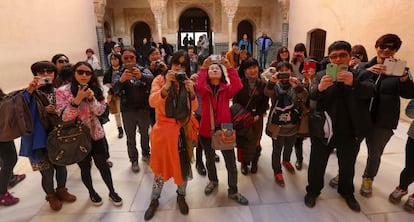Gang accused of €3.5 million ticket scam at Alhambra
Public prosecutors want the 45 defendants to pay Granada tourist site €6.6m in damages

Public prosecutors say that between 2002 and 2005, a 45-strong network of tour guides, hoteliers, travel agents, and monument employees made around €3.5 million from selling entrance tickets to the Alhambra palace in Granada.The alleged scam involved hoteliers and travel agents taking the money for entry tickets from groups of tourists, and then cutting a deal with staff at the Moorish complex, one of Spain’s most-visited historical sites, who would let them in, either without tickets or using forgeries.
After a 10-year investigation, public prosecutors are calling for prison sentences of between four and nine years, along with heavy fines, for the accused. On top of the €3.5 million they are charged with making from the fraud, public prosecutors want the 45 to pay a further €3.1 million, which includes material damage to the site, as well as harm caused to its image internationally.
During the period in question, the number of people allowed into the Unesco World Heritage Site – between 2,000 and 3,000 a day – was regularly exceeded by up to 50 percent, say prosecutors.
Prosecutors say the number of people allowed into the heritage site was regularly exceeded by up to 50 percent
Over the last three years, visitor numbers have fallen slightly at the monument, which was originally constructed in 889, and rebuilt in the early 14th century. But the site’s management says the fall in numbers has not been a problem in terms of takings. The diversification of activities on offer has allowed the figures to match earnings forecasts.
The Alhambra is one of the most in-demand destinations in Spain, particularly for European tourists. Germans and the French top the list, while North Americans make up the largest group of visitors from outside the EU.
One of Spain’s most lucrative monuments, the Alhambra last year received an annual budget of €25 million from the state. In addition to revenue from ticket sales, it also relies on income from donations and sales of books and merchandise.
Tu suscripción se está usando en otro dispositivo
¿Quieres añadir otro usuario a tu suscripción?
Si continúas leyendo en este dispositivo, no se podrá leer en el otro.
FlechaTu suscripción se está usando en otro dispositivo y solo puedes acceder a EL PAÍS desde un dispositivo a la vez.
Si quieres compartir tu cuenta, cambia tu suscripción a la modalidad Premium, así podrás añadir otro usuario. Cada uno accederá con su propia cuenta de email, lo que os permitirá personalizar vuestra experiencia en EL PAÍS.
¿Tienes una suscripción de empresa? Accede aquí para contratar más cuentas.
En el caso de no saber quién está usando tu cuenta, te recomendamos cambiar tu contraseña aquí.
Si decides continuar compartiendo tu cuenta, este mensaje se mostrará en tu dispositivo y en el de la otra persona que está usando tu cuenta de forma indefinida, afectando a tu experiencia de lectura. Puedes consultar aquí los términos y condiciones de la suscripción digital.








































